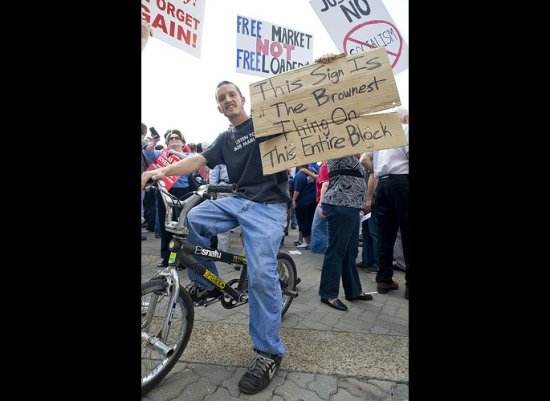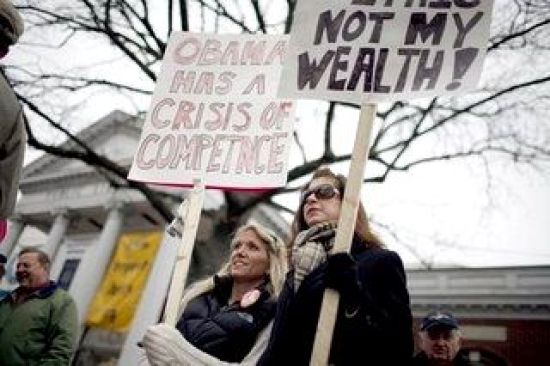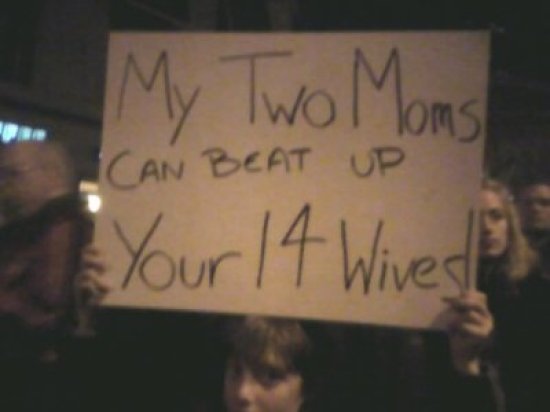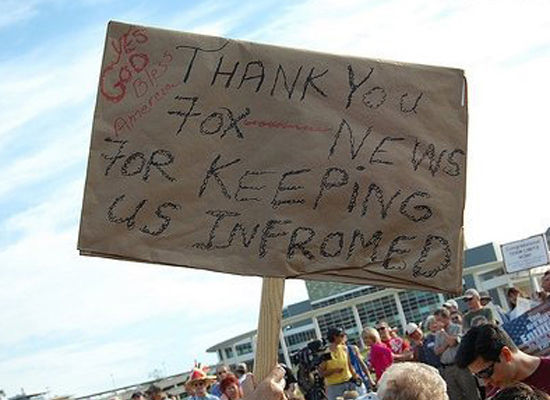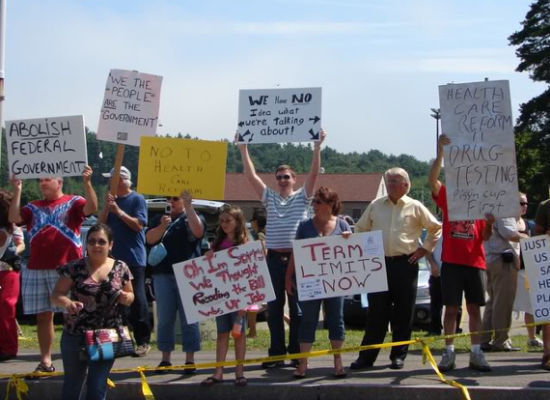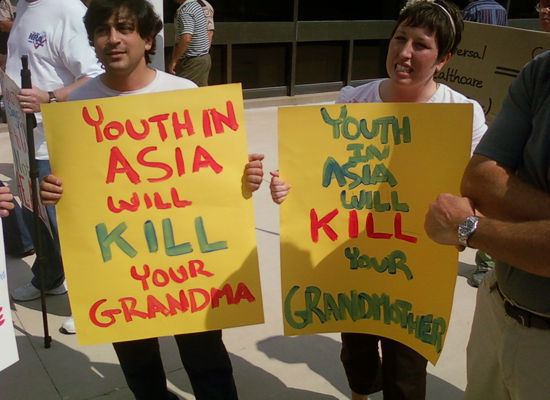Wednesday, September 30, 2009
The Roots "How I Got Over"
Been waiting on this one for a while: . The album "How I Got Over" is scheduled for a November 17th, 2009 release.
You can catch the Legendary every night on Late Night with Jimmy Fallon
NEWS FROM D.C.
D.C. Tied With Seattle as Top City for Young People in Recession
The Wall Street Journal has one of their career trends by ordinal list pieces today on where young people in the United States are deciding to move during the recession, and once again Washington, D.C. is at the top of the list. We've heard almost all of this before, but here's why the newspaper says the D.C. area is the best option for young job seekers:
Government hiring is projected to grow fast, and jobs in lobbying, aerospace, defense contracting and professional services are also a draw. Mr. DeVol calls Washington the national leader in high-tech services, surpassing Silicon Valley. Washington's 4,000-plus nonprofits hold appeal for service-minded youth. And amid rising regulation of financial markets, says Barbara Lang, president of the DC Chamber of Commerce, "much of Wall Street is now moving to K Street."
No big arguments from us here, though we can appreciate finally seeing a little hedging on the sustainability of the "so many government jobs" argument at the end of the D.C. blurb, too. At some point, the federal government is going to have to make cuts, just like all state and local governments have been doing for the last year or so.
Not quite sure how we feel about being scored as "a tie" with that *other* Washington city, Seattle, though. They may have plenty of high-tech jobs and tasty coffee and outdoorsy charm, but surely the endless, soul-crushing rain and gray skies have to be a factor here.
shot out to FRANCE!
LeBron in France. from Good Produce on Vimeo.
Tuesday, September 29, 2009
Mark's September Road Ragings
DC --> Chicago --> Madison --> Milwaukee --> Madison --> Chicago --> DC --> Outer Banks, North Carolina --> DC.
That NC Coast, Sept 28th:
Monday, September 28, 2009
New Classic: Drake "Juice"
I love the Marshawn Lynch shout out.
Yall aint really like me
I can understand
My flow is sitting right inside da pocket on ma pants
I’m still fly, you can’t float
Run this shit, usain bolt
A write your favorite records, aah, you sing ghost
20 thousand for a verse, is our routine quote
I’m getting rich, aah , you staying broke
chilling if even if I'm in a goosed down coat
I cant’ see you through the Mosley Tribes
so i don't even flinch when you throw me hi fives
they try to measure up, but there’s no my size
Whatever 40 smokin bout to low my eyes
Beast mode on them, a never take a night off
Every single thing a nigga purchase is a write off
Grounded as the one way pavement am taking flight off
baby go ahead and cut the lights off
cuz It’s about to go...
I hear ma phone ringing when they call
I aint picking up or entertaining them at all
Got your girl face down and banging on the wall
While you and all your homeboys hang at Lenox Mall
hmmm, hmmm, hmmmmmm
I cannot relate
Riding with some tags that a got from out-a-state
Riding with a swag that a got from out-a-space
Just show me who’s the hottest Ima knock him out his place
call me homeside drizzy, about to kill your ego
I’m about ma green, puffin goody like I’m celo
You can go and take a glance at your hero
while the Houston ship a pole dancing zero
fantasy to you, reality to me
and yeah ma g-pass is as valid as can be
I’m, I’m so fresh, a stylist would agree
waving at your girl
while she’s smiling back at me like…….
Sunday, September 27, 2009
WP: Climate-Change Study Cites Role of Ancient Farming
Has climate change been around as long as the pyramids?
It is an odd-sounding idea, because the problem is usually assumed to be a modern one, the product of a world created by the Industrial Revolution and powered by high-polluting fossil fuels.
But a professor emeritus at the University of Virginia has suggested that people began altering the climate thousands of years ago, as primitive farmers burned forests and built methane-bubbling rice paddies. The practices produced enough greenhouse gases, he says, to warm the world by a degree or more.
Other scientists, however, have said the idea is deeply flawed and might be used to dampen modern alarms over climate change.
Understanding the debate requires a tour through polar ice sheets, the inner workings of the carbon molecule, the farming habits of 5,000-year-old Europeans and trapped air bubbles more ancient than Rome.
"The greenhouse gases went up, and they should have gone down" many thousands of years ago, said U-Va.'s William Ruddiman. "Why did that happen?"
His answer is based on circumstantial evidence. Ruddiman said two events in world history -- an apparent shift in the composition of the atmosphere and the first explosion of human agriculture -- took place at nearly the same time.
"Greenhouse gases do something they never did before," Ruddiman said. "And humans do something the Earth [had] never seen before."
Ruddiman first presented his idea of ancient climate change in 2003. But he returned to the subject last month, in a paper intended to rebut one major criticism -- that there were not enough people on the planet thousands of years ago for their emissions to make a difference.
Ruddiman's response: yes, there were. And in those days, one farmer was as destructive as multiple farmers are today.
He and Erle Ellis, a professor at the University of Maryland Baltimore County, wrote in the journal Quaternary Science Reviews that early farmers did not have modern fertilizer or factory-made tools, but they did have a lot of land. They would clear an area by cutting or burning it, farm the ground until it was nearly barren and move on.
"Those tens of millions [of people] had the impact of hundreds of millions, because per person, they had 10 times the impact," Ruddiman said. "And that's enough to start the curve turning around."
The assertion is the heart of Ruddiman's arguments -- and his critics' complaints. Where he sees human impact on the curving plot of global temperatures, they see a misunderstanding of what nature was doing at the time.
"I think it's a bunch of bosh," said Wallace Broecker, a professor at Columbia University. Broecker said he worried that the idea of pre-modern people as carbon emitters would turn into an argument that the modern world need not worry so much about its own pollution. "I get really upset with him, because people who oppose global warming [legislation] can use this as some dodge."
The science of the debate begins with the idea that Earth has natural freeze-and-thaw cycles, driven heavily by changes in its orbit. The planet is in a warm "interglacial" period, which began 10,000 years ago with the end of the last Ice Age.
Beginning more than 8,000 years ago, Ruddiman said, things should have started slowly cooling off again.
But for some reason, he said, the cooling was less than expected.
Ruddiman thinks the explanation is revealed in long "cores" taken from polar ice, in which tiny bubbles of air have been trapped for thousands of years. He has examined the bubbles and found that about 5,000 years ago, they began showing unexpected increases in carbon dioxide and methane.
His theory is that the gases were pollutants, produced by civilizations on several continents that were picking up the settled life of farmers.
The carbon dioxide, Ruddiman said, could have come from smoke, from forests burned to create farmland on several continents. It could have seeped out of felled trees as they rotted. The methane, a byproduct of decay in swampy water, could have come from areas of Asia newly flooded to grow rice. It also might have been expelled by livestock.
In the atmosphere, Ruddiman says, the gases trap solar heat that might otherwise have bounced back out to space. They were greenhouse gases, the same as now.
His theory is that the trapped heat, amplified by natural feedback cycles, may have kept Earth's temperature steady, when it otherwise might have slipped back toward an ice age. That effect lasted until modern times, he said: temperatures might be more than one degree Fahrenheit higher than they would have been.
The early farmers "did not . . . change the actual climate," said Ellis, Ruddiman's collaborator on the recent paper. "They kept the climate from changing."
But Ruddiman's critics say he is wrong to see human impact here: nature was in control all along.
"I think it's more or less a hypothesis without any evidence to support [it]," said Ken Caldeira, a researcher at the Carnegie Institution for Science in California.
In fact, critics of Ruddiman say, there is strong scientific evidence to prove him wrong. They say that recent studies of very deep ice samples show that ice ages did not always come and go on the same schedule. That could throw off Ruddiman's calculations for when the next round of cooling was supposed to start.
And there is evidence, they say, inside the carbon atoms themselves. Carbon atoms that come from plants can be tracked, by looking at the number of neutrons in their nucleus. If Ruddiman was right, and ancient farmers burned enough plants to change the climate, then the amount of carbon from plants in those bubbles would rise significantly.
But, they say, it did not.
"The general feeling [about Ruddiman's theories] in the community is 'Interesting -- but probably not,' " said Gavin Schmidt, a climate researcher at NASA's Goddard Institute for Space Studies in New York.
Ruddiman, though, says he has science-based counterarguments on both points.
One thing all sides agree on: the suggestion that early farmers were causing climate change is not a sign that the modern world can stop worrying about it.
Ruddiman said there is still a need to cap and reduce greenhouse gases, since modern smokestacks and tailpipes are pumping them out at a level that dwarfs anything from earlier eras.
Friday, September 25, 2009
Paul Krugman: It’s Easy Being Green
So, have you enjoyed the debate over health care reform? Have you been impressed by the civility of the discussion and the intellectual honesty of reform opponents?
If so, you’ll love the next big debate: the fight over climate change.
The House has already passed a fairly strong cap-and-trade climate bill, the Waxman-Markey act, which if it becomes law would eventually lead to sharp reductions in greenhouse gas emissions. But on climate change, as on health care, the sticking point will be the Senate. And the usual suspects are doing their best to prevent action.
Some of them still claim that there’s no such thing as global warming, or at least that the evidence isn’t yet conclusive. But that argument is wearing thin — as thin as the Arctic pack ice, which has now diminished to the point that shipping companies are opening up new routes through the formerly impassable seas north of Siberia.
Even corporations are losing patience with the deniers: earlier this week Pacific Gas and Electric canceled its membership in the U.S. Chamber of Commerce in protest over the chamber’s “disingenuous attempts to diminish or distort the reality” of climate change.
So the main argument against climate action probably won’t be the claim that global warming is a myth. It will, instead, be the argument that doing anything to limit global warming would destroy the economy. As the blog Climate Progress puts it, opponents of climate change legislation “keep raising their estimated cost of the clean energy and global warming pollution reduction programs like some out of control auctioneer.”
It’s important, then, to understand that claims of immense economic damage from climate legislation are as bogus, in their own way, as climate-change denial. Saving the planet won’t come free (although the early stages of conservation actually might). But it won’t cost all that much either.
How do we know this? First, the evidence suggests that we’re wasting a lot of energy right now. That is, we’re burning large amounts of coal, oil and gas in ways that don’t actually enhance our standard of living — a phenomenon known in the research literature as the “energy-efficiency gap.” The existence of this gap suggests that policies promoting energy conservation could, up to a point, actually make consumers richer.
Second, the best available economic analyses suggest that even deep cuts in greenhouse gas emissions would impose only modest costs on the average family. Earlier this month, the Congressional Budget Office released an analysis of the effects of Waxman-Markey, concluding that in 2020 the bill would cost the average family only $160 a year, or 0.2 percent of income. That’s roughly the cost of a postage stamp a day.
By 2050, when the emissions limit would be much tighter, the burden would rise to 1.2 percent of income. But the budget office also predicts that real G.D.P. will be about two-and-a-half times larger in 2050 than it is today, so that G.D.P. per person will rise by about 80 percent. The cost of climate protection would barely make a dent in that growth. And all of this, of course, ignores the benefits of limiting global warming.
So where do the apocalyptic warnings about the cost of climate-change policy come from?
Are the opponents of cap-and-trade relying on different studies that reach fundamentally different conclusions? No, not really. It’s true that last spring the Heritage Foundation put out a report claiming that Waxman-Markey would lead to huge job losses, but the study seems to have been so obviously absurd that I’ve hardly seen anyone cite it.
Instead, the campaign against saving the planet rests mainly on lies.
Thus, last week Glenn Beck — who seems to be challenging Rush Limbaugh for the role of de facto leader of the G.O.P. — informed his audience of a “buried” Obama administration study showing that Waxman-Markey would actually cost the average family $1,787 per year. Needless to say, no such study exists.
But we shouldn’t be too hard on Mr. Beck. Similar — and similarly false — claims about the cost of Waxman-Markey have been circulated by many supposed experts.
A year ago I would have been shocked by this behavior. But as we’ve already seen in the health care debate, the polarization of our political discourse has forced self-proclaimed “centrists” to choose sides — and many of them have apparently decided that partisan opposition to President Obama trumps any concerns about intellectual honesty.
So here’s the bottom line: The claim that climate legislation will kill the economy deserves the same disdain as the claim that global warming is a hoax. The truth about the economics of climate change is that it’s relatively easy being green.
Thursday, September 24, 2009
Snoppy D-O-Double-G: That's Tha Homie
And to round out the day, here is some new Snoop.
ClimateWire: A plan to save rainforests gains international momentum
E&E News:
Jessica Leber, E&E reporter
The scene was one for the history books. Kevin Conrad, representing the small tropical nation of Papua New Guinea, stood up at the 2007 climate negotiations in Bali, Indonesia. He gave the United States two options: Either lead or "get out of the way." The dramatic moment broke a deadlock at the time.
Today, some analysts believe that a plan to save the world's rainforests, championed then by Conrad in Bali, could again carry the day -- this time at international climate talks in Copenhagen in December aimed at drafting a replacement to the Kyoto Protocol.
While the United States and China continue to hedge on their broader commitments to reduce greenhouse gas emissions, negotiators have made steady progress on the plan, known by its acronym REDD, which stands for Reducing Emissions from Deforestation and Forest Degradation.
Rainforest canopy
Before: Because of the lush Amazon rainforest's carbon dioxide-storing capability, preserving it is regarded as essential to reducing the threat of climate change.
The underlying concept seems simple at first glance. Industrialized countries pay to lock carbon into developing nations' forests. The money, if directed as intended, would provide a long-absent motive for local landowners and indigenous populations to abstain from clear-cutting their trees to create ranches, plantations and farms. Conservationists hope it will save the rainforests where decades of other efforts have fallen short.
"We have to value forests when they are alive and standing. Presently, we only value them when they're dead," Conrad told reporters yesterday. He spoke after a high-level meeting at the United Nations yesterday, attended by Secretary-General Ban Ki-moon and key world leaders.
A deal with appeal to rich and poor nations
Those who have watched REDD's development since it was first placed on the international agenda by Papua New Guinea in 2005, say that it may provide the best hope for a concrete deal that includes nations both rich and poor.
"I regard it as having the potential to be at center stage in Copenhagen as a mechanism for breaking logjam and enabling an overall agreement," said Annie Petsonk, international counsel for the Environmental Defense Fund. She said yesterday's meeting was encouraging because many prominent leaders attended and declared the importance of REDD in the broader framework.
REDD is powerful because it is one of the quickest and cheapest available options for slowing the trajectory of rising temperatures in the atmosphere. Deforestation causes nearly 20 percent of global greenhouse gas emissions, the equivalent of the world's entire transport sector. Indonesia and Brazil are, respectively, the world's third- and fourth-largest emitting nations. In Brazil, deforestation is responsible for 70 percent of emissions.
"Protecting tropical forests is one of the most affordable ways to reduce climate pollution," Glenn Hurowitz, Washington director of the nonprofit Avoided Deforestation Partners.
According to figures cited at the U.N. meeting, a ballpark of $22 billion to 36 billion dollars of global investment in REDD by 2015 -- a relatively small amount in the grand climate financing scheme -- could cut global deforestation rates by a quarter.
That low cost is a big carrot for the United States. At a bargain price of about $5 a ton, REDD credits could either slash expenses in meeting emissions targets or afford lawmakers the flexibility to propose more lofty aims. For example, the cost of the climate legislation passed by the House, sponsored by Reps. Henry Waxman (D-Calif.) and Edward Markey (D-Mass.), would rise by 89 percent without its international offset options, most of which would come from tropical forest projects, U.S. EPA estimated.
So far, the U.S. and other big emitters sit on their wallets
But at the United Nations yesterday, big emitters, including the United States, backed away from offering firm financing to fund REDD goals, echoing deadlocks seen elsewhere in the negotiations. "Developing nations are willing to lead, provided they work in partnership with developed nations and receive the required financial and technical support," said Secretary-General Ban.
Those very developing nations also lamented the lack of progress. "There isn't adequate financing currently on the table," said Guyanese President Bharrat Jagdeo. The president said that he and others were expending precious political capital championing a cause that could potentially slow their development, while Western nations refused to do the same.
And a focus on the potential pitfalls of REDD, rather than its benefits, means that it is not receiving the attention it needs to be included prominently in a Copenhagen agreement, he said.
But embedded in those pitfalls are other open questions that have yet to be resolved beyond the issue of cold, hard cash: namely, how and to whom that money will be delivered, who will claim credit and responsibility for the carbon output avoided, and how it all fits into a broader climate deal.
Brazil and the United States are the two countries with perhaps the most at stake in the answers. High-level leaders of the former were notably absent from yesterday's meeting and U.S. Secretary of State Hillary Rodham Clinton, on the program to attend, did not come due to a scheduling conflict.
Brazil has sovereignty worries
For years, Brazil's leaders, fearful of ceding sovereignty over its own lands, opposed any discussion of tropical deforestation in climate negotiations. But since 2003, the country has reversed that attitude and has also promised to slash its forestry emissions by an impressive 80 percent by 2020, with the help of a $1 billion investment from Norway.
Deforestation
After: "Slash and burn" farming techniques turn forests into ash and rubble for relatively short-term economic gains.
The Amazon nation, however, has big reservations about sharing the fruits of its efforts by offering credits on a market, which could ultimately give the United States a free pass to make fewer of its own sacrifices. Instead, it wants to receive most of its funds outright to meet its own goals, although even that stance is slipping as powerful state leaders push Brazil's leadership for access to open markets, said Hurowitz of Avoided Deforestation Partners.
Less powerful countries are also pushing back. The Coalition for Rainforest Nations, a bloc of 32 countries, including Indonesia and Guyana, wants developed nations to fund two successive REDD start-up phases. These would help individual countries build the capacity to create, measure and verify legitimate forest carbon projects, according to Federica Bietta, deputy director of the coalition, which Conrad heads.
Ultimately, the coalition envisions a third phase, one that is key to the United States: credits sold to the market to offset buyers' emissions. This market approach, the coalition believes, would make it harder for a few countries to monopolize the wealth.
And African nations in the Congo Basin, which have so far maintained more of their forests, don't want to be left out of the pool. That may eventually require a different payment plan to reward landowners despite their low historic deforestation rates. "The Copenhagen process must not leave precious forests like the Congo Basin unprotected just because it is not so-called 'high risk,'" wrote Denis Sassou Nguesso, president of the Republic of the Congo, in an op-ed in the Boston Globe this week.
Such insurance will also prevent loggers and ranchers from getting visas and moving to new nations where they can still slash and burn. This is a prospect several small island nations, slated to disappear off the map as sea level rises, fear the most.
A game changer for negotiations
In the end, the power of progress on REDD is also in how it could change the negotiating dynamic.
Depending on its structure, a forest payment plan could allow major emitters, such as Brazil, to adopt binding emissions targets financed in part by international funds. Smaller nations, such as Papua New Guinea and many African countries, meanwhile, could use the aid to prove they are contributing what they can to global goals.
And because U.S. businesses so desperately want the cost savings of offset credits, the scheme gives tropical nations leverage to push the United States to adopt more stringent emissions targets. Brazil, for example, has signaled that it plans to do exactly this, said Hurowitz. That dynamic tension could even nudge along a U.S. deal with China, said Environmental Defense Fund counsel Petsonk.
Despite all the talk, however, there have been few projects of substantial size that would now measure up to what everyone involved promises will be stringent integrity standards.
Although both the United Nations and the World Bank have raised millions of dollars to prepare nations to stem the tide of carbon leaving their forests, these funds have not yet been filled, and billions more will ultimately be needed, said the Coalition for Rainforest Nations' Bietta. Hurowitz said that some countries may be willing to commit to REDD funding before Copenhagen, while others -- like the United States -- will be loath to get ahead of domestic legislation.
The pending U.S. legislation does look promising. The Waxman-Markey bill would offer 5 percent of annual emissions revenues to fund extra emissions reductions through tropical forest projects, and would also permit up to 2 billion tons a year of offsets. And yesterday, dozens of prominent U.S. ecologists wrote to President Obama, urging him to definitively link tropical forest conservation with his global climate mission.
But as with the broader negotiations, progress is slow. "So far, it's all talk. There is no REDD," said the Environmental Defense Fund's tropical forest policy director, Steve Schwartzman. But he said efforts to change that over the next few months look promising. "You can really see some light at the end of the tunnel."
FOREVER the video
Tuesday, September 22, 2009
J.Period x K'Naan - The Messengers (Deluxe Edition) Extended Mixtape + Bonus Tracks + Selected 12" S

"The record is not over yet.........."
Didn't know it was coming, but we NOW have the final chapter to the J. Period x K'Naan The Messengers project. Here is The Messengers (Deluxe Edition), featuring an extended mixtape, bonus tracks, and selected 12" singles. This long-play version of the project gives you remixed and re-imagined music inspired by these three legendary artists (Fela Kuti, Bob Marley, Bob Dylan).
Here is the download link as well as a behind-the-scenes video, "Making The Messengers."
DOWNLOAD THE MESSENGERS EXTENDED MIXTAPE
K'Naan & J Period - The Messengers Mixtape from Mark Valino on Vimeo.
BK-One: Here I Am feat. Phonte, Brother Ali & The Grouch
Download here
"Better known as Brother Ali’s DJ, BK-One takes his years of experience as a DJ and puts on his producer hat joining forces with up and coming Twin Cities beatsmith Benzilla to craft a Brazilian musical bed for some of Hip Hop’s most engaging MC’s. Rádio Do Canibal features appearances by Scarface, Slug (Atmosphere), Black Thought (The Roots), Brother Ali, Raekwon (Wu-Tang Clan), Murs (Living Legends), Phonte (Little Brother), Haiku D’ Etat (Aceyalone, Myka 9 & Abstract Rude), Blueprint, P.O.S. (Doomtree), The Grouch (Living Legends), I Self Devine, Toki Wright, Aby Wolf and The Hypnotic Brass Ensemble."
Obama’s address to the UN climate summit
As Prepared for Delivery:
Good morning. I want to thank the Secretary-General for organizing this summit, and all the leaders who are participating. That so many of us are here today is a recognition that the threat from climate change is serious, it is urgent, and it is growing. Our generation¹s response to this challenge will be judged by history, for if we fail to meet it boldly, swiftly, and together we risk consigning future generations to an irreversible catastrophe.
No nation, however large or small, wealthy or poor, can escape the impact of climate change. Rising sea levels threaten every coastline. More powerful storms and floods threaten every continent. More frequent drought and crop failures breed hunger and conflict in places where hunger and conflict already thrive. On shrinking islands, families are already being forced to flee their homes as climate refugees. The security and stability of each nation and all peoples our prosperity, our health, our safety are in jeopardy. And the time we have to reverse this tide is running out.
And yet, we can reverse it. John F. Kennedy once observed that ³Our problems are man-made, therefore they may be solved by man.² It is true that for too many years, mankind has been slow to respond to or even recognize the magnitude of the climate threat. It is true of my own country as well. We recognize that. But this is a new day. It is a new era. And I am proud to say that the United States has done more to promote clean energy and reduce carbon pollution in the last eight months than at any other time in our history.
We're making our government's largest ever investment in renewable energy an investment aimed at doubling the generating capacity from wind and other renewable resources in three years. Across America, entrepreneurs are constructing wind turbines and solar panels and batteries for hybrid cars with the help of loan guarantees and tax credits projects that are creating new jobs and new industries. We¹re investing billions to cut energy waste in our homes, buildings, and appliances helping American families save money on energy bills in the process. We¹ve proposed the very first national policy aimed at both increasing fuel economy and reducing greenhouse gas pollution for all new cars and trucks a standard that will also save consumers money and our nation oil. We¹re moving forward with our nation¹s first offshore wind energy projects. We¹re investing billions to capture carbon pollution so that we can clean up our coal plants. Just this week, we announced that for the first time ever, we¹ll begin tracking how much greenhouse gas pollution is being emitted throughout the country. Later this week, I will work with my colleagues at the G20 to phase out fossil fuel subsidies so that we can better address our climate challenge. And already, we know that the recent drop in overall U.S. emissions is due in part to steps that promote greater efficiency and greater use of renewable energy.
Most importantly, the House of Representatives passed an energy and climate bill in June that would finally make clean energy the profitable kind of energy for American businesses and dramatically reduce greenhouse gas emissions. One committee has already acted on this bill in the Senate and I look forward to engaging with others as we move forward.
Because no one nation can meet this challenge alone, the United States has also engaged more allies and partners in finding a solution than ever before. In April, we convened the first of what have now been six meetings of the Major Economies Forum on Energy and Climate here in the United States. In Trinidad, I proposed an Energy and Climate Partnership for the Americas. We¹ve worked through the World Bank to promote renewable energy projects and technologies in the developing world. And we have put climate at the top of our diplomatic agenda when it comes to our relationships with countries from China to Brazil; India to Mexico; Africa to Europe.
Taken together, these steps represent an historic recognition on behalf of the American people and their government. We understand the gravity of the climate threat. We are determined to act. And we will meet our responsibility to future generations.
But though many of our nations have taken bold actions and share in this determination, we did not come here today to celebrate progress. We came because there is so much more progress to be made. We came because there is so much more work to be done.
It is work that will not be easy. As we head towards Copenhagen, there should be no illusions that the hardest part of our journey is in front of us. We seek sweeping but necessary change in the midst of a global recession, where every nation¹s most immediate priority is reviving their economy and putting their people back to work. And so all of us will face doubts and difficulties in our own capitals as we try to reach a lasting solution to the climate challenge.
But difficulty is no excuse for complacency. Unease is no excuse for inaction. And we must not allow the perfect to become the enemy of progress.
Each of us must do what we can when we can to grow our economies without endangering our planet and we must all do it together. We must seize the opportunity to make Copenhagen a significant step forward in the global fight against climate change.
We also cannot allow the old divisions that have characterized the climate debate for so many years to block our progress. Yes, the developed nations that caused much of the damage to our climate over the last century still have a responsibility to lead. And we will continue to do so by investing in renewable energy, promoting greater efficiency, and slashing our emissions to reach the targets we set for 2020 and our long-term goal for 2050.
But those rapidly-growing developing nations that will produce nearly all the growth in global carbon emissions in the decades ahead must do their part as well. Some of these nations have already made great strides with the development and deployment of clean energy. Still, they will need to commit to strong measures at home and agree to stand behind those commitments just as the developed nations must stand behind their own. We cannot meet this challenge unless all the largest emitters of greenhouse gas pollution act together. There is no other way.
We must also energize our efforts to put other developing nations especially the poorest and most vulnerable on a path to sustainable growth. These nations do not have the same resources to combat climate change as countries like the United States or China do, but they have the most immediate stake in a solution. For these are the nations that are already living with the unfolding effects of a warming planet famine and drought; disappearing coastal villages and the conflict that arises from scarce resources. Their future is no longer a choice between a growing economy and a cleaner planet, because their survival depends on both. It will do little good to alleviate poverty if you can no longer harvest your crops or find drinkable water.
That is why we have a responsibility to provide the financial and technical assistance needed to help these nations adapt to the impacts of climate change and pursue low-carbon development.
What we are seeking, after all, is not simply an agreement to limit greenhouse gas emissions. We seek an agreement that will allow all nations to grow and raise living standards without endangering the planet. By developing and disseminating clean technology and sharing our know-how, we can help developing nations leap-frog dirty energy technologies and reduce dangerous emissions.
As we meet here today, the good news is that after too many years of inaction and denial, there is finally widespread recognition of the urgency of the challenge before us. We know what needs to be done. We know that our planet¹s future depends on a global commitment to permanently reduce greenhouse gas pollution. We know that if we put the right rules and incentives in place, we will unleash the creative power of our best scientists, engineers, and entrepreneurs to build a better world. And so many nations have already taken the first steps on the journey towards that goal.
But the journey is long. The journey is hard. And we don¹t have much time left to make it. It is a journey that will require each of us to persevere through setback, and fight for every inch of progress, even when it comes in fits and starts. So let us begin. For if we are flexible and pragmatic; if we can resolve to work tirelessly in common effort, then we will achieve our common purpose: a world that is safer, cleaner, and healthier than the one we found; and a future that is worthy of our children. Thank you.
Friday, September 18, 2009
LA Times: 'Redskins' is no honor, it's an insult

I've often been hesitant to say that I am a true "Redskins" fan, because while I am a big fan of the team that plays at in Landover and calls our nation's capital home, I absolutely loath the name "Redskins." It is so offensively racist, and I have no idea why it hasn't been changed. They changed the Bullets to the Wizards because DC had too many homicides. We are the nation's capital. What does it tell you when the most profitable team in our nation's capital is a racist name. I believe it was Chris Rock who made the comparison that the Washington Redskins was exactly the same as have a team called the Newark N!ggers.
I really hope some of the Redskins players stand up and speak out about this.
Here is a piece written by Bill Plaschke of the LA Times:
On a Saturday night in New York, the sports world vilifies Serena Williams for raining threats upon a line judge.
Yet a day later across the river, the same sports world celebrates a team whose nickname is considered a threat to an entire ethnic group.
Redskins.
A pro football season begins with two noted players banished to the sidelines for "conduct detrimental to the integrity of, and confidence in, the National Football League."
Yet that same league supports a team whose entire identity is forged through a symbol of detrimental conduct known as racism.
Redskins.
It remains one of the great mysteries in sports, a 77-year-old crime that remains largely ignored and purposely unsolved.
How does a team from the nation's capital, supported by a fan base of some of the nation's greatest thinkers, maintain a nickname that is the Native American equivalent to the N-word?
Redskins?
"It is the worst thing in the English language you can be called if you are a native person," said Suzan Shown Harjo, a Native American writer and public policy advocate who is the lead plaintiff in one of the most compelling lawsuits in sports history.
Seventeen years after challenging the Washington Redskins trademark, Harjo and six others have renewed their fight, petitioning the Supreme Court to examine a lower-court ruling that denied their challenge on a technicality.
It was announced Monday that Harjo's group will appeal the decision that their challenge was made too late and falls outside the statute of limitations.
The Redskins, named in 1933, were registered as a trademark during a vastly different racial climate in 1967.
Harjo's group challenges that, now and then, the trademark violates the Lanham Act, which bars trademarks that "disparage" people living or dead.
She's on time. Of the several high-profile Native American nicknames still alive in sports, nothing is more clearly disparaging than this one.
While the Braves, Indians, Chiefs and Blackhawks all describe a group of people, the Redskin is the clear slur of an individual.
Look it up. It is listed as "offensive" in most dictionaries, and as the name given an Indian hunter's bounty in several historical publications.
"It is basically characterizing a person by their skin," Harjo said. "How wrong is that?"
The NFL and the Redskins counter with an argument found on Page 326 of the team's media guide, citing that the word "Redskin" actually refers to the red paint used on the skin of Indian warriors.
A league spokesman said they stand by the Redskins in this battle and, in fact, the NFL has paid much of the Redskins' legal fees.
Amazing, isn't it, how the sports world demands civility and good conduct only as long as it doesn't get in the way of tradition? When it comes to Native American mascots, insensitivity dies especially hard.
Chief Illiniwek has been banned from the University of Illinois, yet fans still stand up during halftime of football games and chant his name during the traditional time for his appearance.
Some fans at otherwise educated Dartmouth and Stanford, even though they have long since banned their Indian mascots, still show up at games with painted faces on their shirts.
"People lose their sense of discernment when it comes to sports," Harjo said. "With this particular issue, people just lose their minds."
Particularly in pro sports, and particularly in Washington, where one man's insult has become another man's birthright, and rationalizations run rampant.
It's stunning how many people there will insist that the word "Redskins" pays tribute to Native Americans . . . even though none of those people are Native American.
"They say, 'You're being honored' . . . we say, 'We're being offended,' " explained Harjo. "They say honored. We say offended. Then they just tell us to shut up."
Unlike the Seminoles of Florida State, there is no tribe that supports "Redskin." Unlike with some other mascots such as Warriors, there are no Native American groups that are even lukewarm about it.
"All national Indian groups support us," said Harjo, who is president of the Morning Star Institute, a Washington-based native cultural organization.
There is, in fact, precedent for changing the Redskins mascot, as it has already been deleted from major-college sports with little impact.
Miami of Ohio has become the RedHawks, and it didn't seem to bother quarterback Ben Roethlisberger.
The University of Utah has become the Utes, who weren't any less tough when they nearly stole a national football championship last year.
The name can be changed. The name should be changed. There is not a bigger certifiable slur in sports. There is nothing even close.
And don't even try to compare this to the Fighting Irish, OK?
If you saw a Native American on the street, would you call that person a redskin?
"It's like putting Aunt Jemima on a helmet," Harjo said.
There has long been an argument that young native Americans don't mind being used as sports symbols, but Harjo isn't buying that as a factor.
"Lots of people are saying, 'Just let us have our gambling and we'll stay out of the way,' " she said. "That doesn't make it right."
Some say Redskins owner Daniel Snyder will never make it right because it will cost too much money in merchandising. But imagine the riches he would reap with new apparel.
Some say NFL Commissioner Roger Goodell would never dare mess with one of the league's cornerstone franchises. But what better way to cement his growing legacy as a curator of equality and fairness?
Of course, it is a formidable task, fighting both men.
"We aren't just fighting Coke, we're fighting Pepsi backed by Coke," Harjo said.
And, indeed, it is a fight they lose every day.
"We are the invisible population," she said of the approximately 4 million Native Americans. "So racism against our population is also invisible."
Then again, there is this:
The original lawsuit was filed in 1992, after the Redskins' Super Bowl victory over the Buffalo Bills. At the time, the Redskins had appeared in four Super Bowls in the previous 10 years.
In the 17 years since, they have appeared in exactly zero Super Bowls.
Hail to the what, exactly?
WP - Eugene Robinson: The Favor Jimmy Carter Did Us All
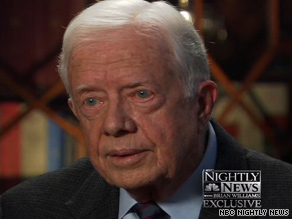
Everyone was thinking exactly this. I've said it repeatedly. It took an old white man to say it for anyone to take any notice. It's very very true.
WP:
What I wrote last year about candidate Barack Obama -- that to win he had to be seen as "the least-aggrieved black man in America" -- may be even more relevant now. To lead this diverse and fractious nation effectively, the president has to negotiate racial issues with delicacy, caution and tact. He has to give even his most vocal critics the benefit of the doubt.
But I don't. So I can say in plain language that Jimmy Carter was right in essence, but wrong in degree. It seems clear to me that some -- but not "an overwhelming portion," as Carter claimed -- of the "intensely demonstrated animosity" toward Obama is indeed "based on the fact that he is a black man."
Obama disagrees. "The president does not believe that criticism comes based on the color of his skin," White House press secretary Robert Gibbs said Wednesday. Obama is the most garrulous president in many years, but when a reporter asked him about Carter's remarks, he had not a word to say.
Nor do many other leading Democrats -- outside of the Congressional Black Caucus -- want to touch this explosive subject. As a matter of political strategy, I don't blame them. The minute you observe that some of Obama's critics seem to be motivated by race, the critics howl that they're all being smeared as "racists" simply because they disagree with Obama's policies. This is not true.
Of course it's possible to reject Obama's policies and philosophy without being racist. But there's a particularly nasty edge to the most vitriolic attacks -- a rejection not of Obama's programs but of his legitimacy as president. This denial of legitimacy is more pernicious than the abuse heaped upon George W. Bush by his critics (including me), and I can't find any explanation for it other than race.
I'm not talking about the majority of the citizens who went to town hall meetings to criticize Obama's plans for health-care reform or the majority of the "tea bag" demonstrators who complain that Obama is ushering in an era of big government. Those are, of course, legitimate points of view. Protest is part of our system. It's as American as apple pie.
I'm talking about the crazy "birthers." I'm talking about the nitwits who arrive at protest rallies bearing racially offensive caricatures -- Obama as a witch doctor, for example. I'm talking about the idiots who toss around words like "socialism" to make Obama seem alien and even dangerous -- who deny the fact that he, too, is as American as apple pie.
This whole discussion was kicked off by Rep. Joe Wilson's "You lie!" outburst during Obama's address to a joint session of Congress. As the House members who voted to rebuke Wilson -- including seven fellow Republicans -- understand, calling the head of state a liar in such an official setting is way out of bounds. Grumbling and even booing come with the territory, but a flat accusation of mendacity is an impermissible sign of disrespect. Nobody ever called Bush a liar when he was speaking in the House chamber.
Why would Wilson think he was entitled to insult the president this way? Why would he refuse to offer a formal apology on the House floor, which would have ended the matter? I have no idea. Friends and colleagues say he is no racist, and they know the man a lot better than I do. But he does have a history.
Before he was elected to Congress, Wilson was one of a handful of South Carolina state senators to vote to keep the Confederate flag flying above the State House in Columbia. This was after a long, bitter battle over the flag had distilled the issue, at least in the minds of most South Carolinians, into a proxy fight over race: Was the state going to move forward, or would it cling to its shameful past? Most politicians in the state, including most conservatives, had decided it was time to move on. Wilson was one of the last diehards.
That, of course, was his right. But now that he has committed a singular act of disrespect toward the first African American president, it's my right to ask whether his motivation was racial.
I look forward to the day when we can look past race. But before we can do so, we need to look at race and see it clearly. Jimmy Carter did us a favor.
Thursday, September 17, 2009
John Forte' Live TONIGHT

Fugees Camp affiliate/producer John Forte performs live. Performing some of the classics and also songs from his most recent highly anticipated release.
Liv
2001 11th St, NW
Washington, 20001
Early Bird Tickets available for a limited time at $12
http://johnfortedc.eventbrite.com/
Wednesday, September 16, 2009
J.Period x K'Naan - The Messengers Episode #3: Bob Dylan [Mixtape]

This is episode 3 (the third and final installment) and is dedicated to America’s reluctant Civil Rights song leader and poetic voice, Bob Dylan. Dylan’s own struggle with his status as a 'Messenger' is well-documented: he shunned the tremendous expectations placed on him during the 60’s, preferring to see himself as a songwriter rather than a social leader. Nevertheless, the impact of his music is undeniable and, over 40 years since Dylan’s arrival, J.Period & K’NAAN set out to show his continued relevance, both socially and musically." J. Period remixes Dylan's music with a hip-hop twist while K lays the vocals. Features on this episode include DJ Preservation, and bassist Brian Satz.
Download: The Messengers #3: Bob Dylan
J.Period, K'NAAN & Co. in South Africa for K'NAAN's World Tour 2009 from Truelements Music on Vimeo.
Official Press Release:
New York, NY (August 18, 2009) – Some artists are defined by their environment. Some redefine their environment. Still others push the boundaries of convention so fully that their influence is felt around the globe, and across generations. Their music compels us not only to dance but to think, not only to celebrate but to strive, not only to listen but to truly hear. Fela Kuti, Nigeria’s eminent musical activist; Bob Marley, Jamaica’s emissary of struggle and unity; and Bob Dylan, America’s reluctant Civil Rights song leader, are three such artists.
These are “The Messengers.”
Today, August 18, 2009, acclaimed DJ/Producer, J.Period, and rising Somali-born MC, K’NAAN, are pleased to announce a unique and powerful remix project, paying tribute to the lasting legacy of these musical giants. Weaving afro-beat, reggae, ska, folk music and rock into this genre-bending musical experience, The Messengers stretches the boundaries of hip hop—and the mixtape genre itself. Remixing the classic work of Fela, Marley and Dylan, The Messengers captures the timelessness of their sounds and the continued urgency of their messages. The result, as fans have come to expect from J.Period, is like no mixtape you’ve ever heard.
The Messengers arrives on the heels of K'NAAN's sophomore release, Troubadour (A&M/Octone Records), released January 2009. Having already made a powerful mark with his breakthrough debut, K’NAAN’s Troubadour debuted at #32 on Billboard’s Top 200, continuing his rapid rise on the world stage. Filled with eloquent and thought-provoking lyrics in the tradition of great folk singers and protest songs, the album also features all-star collaborations with Damian Marley, Mos Def, Kirk Hammett (Metallica), Adam Levine & James Valentine (Maroon 5) and Chubb Rock.
With a track record for game-changing remix projects (his recent collaboration with Q-Tip yielded over 600,000 downloads), J.Period’s ever-expanding highlight reel boasts remixes for heavyweights from Mary J. Bilge to The Roots to Kanye West, as well as original production for blockbuster films and video games. Commissioned by labels, artists and lifestyle brands for his groundbreaking promo campaigns, J.Period has not only elevated the mixtape to an art form, but consistently proved its viability as a potent promotional tool. Each release raises the bar, and with The Messengers, J.Period proves that his musical ear and signature documentary style are at home in any genre
K’NAAN’s compelling personal story (raised in war-torn Mogadishu, descendant of famed Somali singers and poets) has also fueled his international appeal: bridging styles and audiences; re-invigorating hip hop’s global influence; and altering perception of his homeland, Somalia (recently hailed as the world’s “Most Dangerous Destination” by Forbes Magazine). In hip hop, where MCs wear bullet wounds like badges of honor, few have actually lived through war, and even fewer emerged with a message of peace. K’NAAN has, making his lyrics on “The Messengers” not just a tribute to Fela, Marley and Dylan, but a testament to the transformative power of music itself.
"This project is really special to me,” says K’NAAN, “Not the product of ego but of passion. Far from a marketing tool, it is an honest musical offering. Nothing gives a better window into the root and concept of my own sound than The Messengers"
“A lot of people say hip hop is in a stagnant place, but I see few actually doing something about it,” says J.Period. “I love the The Messengers because the concept is completely unique, but still true to the original spirit of hip hop: combining the best elements from everywhere to create something fresh, to make a new statement. Fela, Marley and Dylan proved that when great music meets a powerful message, the result lives forever. I hope K’NAAN and I have done their legacies justice with this project.”
After an Invitation-Only Launch Party in Toronto (K’NAAN’s current home) on August 15, The Messengers will be released in 5 parts over the course of 5 weeks, beginning with the first installment—a 3-song digital EP featuring one Fela remix, one Marley, and one Dylan—on Tuesday, August 18. Following the EP release, J.Period & K’NAAN will pay tribute to each of “The Messengers” individually with a new release every Tuesday in September, beginning with a tribute to Fela Kuti (September 1), Bob Marley (September 8), Bob Dylan (September 15), and culminating in the release of The Messengers in its entirety (including additional bonus tracks and artwork) on September 22.
Each digital release will also be accompanied by an exclusive illustration by graphic artist, Fuse Green (http://www.fusegreen.com), the tremendous talent behind J.Period’s iconic cover art (Q-Tip, Lauryn Hill, The Roots, Game Rebellion)
The Messengers boasts a lineup of talented guest artists from around the globe: New York’s M1 (Dead Prez), Toronto’s Kardinal Offishall, Sierra Leone's rising talent Bajah + Dry Eye Crew (http://planetbajah.com), Brooklyn’s Steele (Smif’N’Wessun), Oakland’s Zumbi (Zion I), Game Rebellion front man Netic the Rebel, bassist Brian Satz, talented producer DJ Preservation, and mixer/engineer, Alex Moulton (www.expansionteam.org).
Thursday, September 10, 2009
Fashawn & The Alchemist - The Antidote [Mixtape]

Fashawn and The Alchemist have teamed up to bring you The Antidote. This 11 track project was completely compiled and produced by Alchemist as a warmup for Fash's upcoming debut collabo album with Exile, Boy Meets World (10/20).
Download: The Antidote
J.Period x K'Naan - The Messengers Episode #2: Bob Marley [Mixtape]

One week after dropping Episode One of the J.Period x K'naan project, The Messengers featuring Fela Kuti, J and K are back with the second installment. This tape is dedicated to the legendary Bob Marley, "Jamaica's global emissary of struggle & unity." J.Period remixes iconic tracks like "Belly Full," "Shot The Sheriff," and "Stir It Up," while K'Naan shows why he is one of the next generation's illest MC's. "Accompanying K on the mic are Kardinal Offishall, Steele (Smif N Wessun), Sierra Leone's Bajah (Dry Eye Crew), and Netic the Rebel (Game Rebellion)." Below the download link, and look out for episode 3, featuring Bob Dylan, next week.
Download "The Messengers: Bob Marley"
KiD CuDi "Day 'N' Nite (Crookers Remix)"
KiD CuDi's debut album, Man on the Moon: The End of Day, drops next Tuesday (9/15). Above is the Crookers Remix video for KiD CuDi's song, "Day 'N' Nite," directed by BBGUN. This is the original vid that was shot way back in April of '08, and in my opinion it looks just as good as (if not better than) the final version (this one had a $250 budget).
Tuesday, September 8, 2009
WP - Eugene Robinson: A Middle Ground Gone Missing

WP:
The rule among politicians in Washington used to be that when the provincials become restless, as they are now, the safest thing to do is run to the center. But as this sour and unsettled summer ends, the political center looks like the white line running down the middle of a busy street -- a foolish place to stand and an excellent place to get run over.
President Obama might want to keep that image in mind, not only as he navigates the health-care endgame but also as he charts his way through the rest of his ambitious and promising agenda. He is a master at threading the needle by rejecting what he calls "false choices." But some choices are made of concrete and can only be postponed, not avoided.
It is a core belief of Washington's political culture that policymaking by compromise -- "meeting in the middle" -- is the way to gain and keep the support of the vast, moderate, essentially reasonable group of voters who constitute a coherent political center. My problem with this analysis is that so many of the big decisions that have to be made are binary: yes or no. The terrain in the middle consists only of "maybe" or "kind of," and I see no evidence that the country is in a "maybe" or "kind of" mood.
Much of the energy, passion and anger on display at the health-care town-hall meetings was irrational and based on ridiculous misinformation. But the emotion was real, and it reflects the fact that the far right is essentially taking an obdurate, rejectionist stance toward anything Obama tries to do.
Republicans in Congress clearly have decided that it is in their interest to keep these motivated activists within the fold -- even the crazy "birthers" who deny Obama's legitimacy as president and the militant yahoos who question his patriotism. If ever there was a chance to win Republican support for legislation providing meaningful health-care reform, that moment has passed.
This makes health care essentially an intramural fight among Democrats. The party's activist left isn't as raucously gonzo as its Republican analogue. But it would be a mistake for the president or Democratic leaders in Congress to underestimate the passion for health-care reform among their party's activist base.
Democrats have dreamed of universal health care since the Truman administration. Obama campaigned on a promise to deliver it, or something very close. Progressive Democrats in the House, the AFL-CIO and other key Democratic Party actors sounded as if they meant it when they warned the White House not to abandon the idea of a public health-insurance option.
In retrospect, it was probably a mistake for Obama to allow the public option to become such a litmus test. A government-run program is not a prerequisite for universal health care, as nations such as Germany, France and Japan have demonstrated. But the only reasonable trade-off for dropping the public option, in my view, would be the ability to move health-insurance coverage much closer to true universality. Instead, the Senate "Gang of Six" negotiators -- those trying to somehow "meet in the middle" -- seem to be moving in the opposite direction.
Democrats are right to believe that they have to pass some kind of health-care bill or be accused -- justly, I'd say -- of stunning incompetence. But what's the point of making concessions to Republicans who, in the end, aren't going to vote for the legislation anyway?
And as for the centrist Democrats who represent swing states and are trying to reduce the whole exercise to "reform lite," who do they think will be most vulnerable at the polls if the reform effort fails and voters decide to punish the party? Do they think they have a chance of beating their next Republican opponents if progressive activists aren't enthusiastic about writing checks, making phone calls and going door to door?
In the end, Democrats will probably reason that something is better than nothing and pass some kind of bill that can be labeled "reform." But if it's seen as watered-down, Obama may pay a price. Progressives have been willing to cut him slack on deepening U.S. involvement in Afghanistan, on the largess that's been showered upon Wall Street, on not fully investigating Bush-era abuses. Those, too, could be made into binary issues -- and the "center" could look even more like a tightrope.
My review of Blueprint 3 at DJbooth.net
 MidnightMaruder
MidnightMaruder 



 MidnightMaruder's Top Rated Songs
MidnightMaruder's Top Rated Songs My 3 most disappointing aspects of the BLUEPRINT III -
3) No real hard swings at the GAME! Whatever, beef is overrated anyways.
2) No NAS! I thought that they might get down on another track b/c they are on the same team now. This goes along with there being a lack of any classic MC on the album (other then Jay himself). I've always dreamed of a JayZ ft. Rakim/KRS/Andre3000/Ghostface etc. - on one of his albums. It didn't happen, kinda disappointed.
1) Kanye's songs! "Run this town" is borderline wack/okay, nothing really to it and it definitely lacks any creativity. Does anyone else think that Rhianna is annoying on it? "Hater" has a horrible beat - but I have to say that their beats on it are pretty ill. I was kinda hoping for a ridiculously tight Kanye song to cruise to or one that is just a little less sleepy. Ain't no love in the heart of the city!
My 3 BEST aspects of the album!
3) Giving the new school some props! J. Cole, Drake, Jeezy, Cudi - I like the fact that he took time to make some ill tracks with them. Not sure which one of the songs is the best - might go with the Jeezy. "A Star is born" gives props to the old school and then explains who's next, well done on that one.
2) Empire State and Thank You are straight classics. Alicia Keys is amazing. Laid back songs perfect for the end of the summer chillings.
1) You can basically listen to this album straight thru - no song is THAT bad to everyone. Kind of has something for everyone in that sense.
PEACE!
Read more: http://www.djbooth.net/index/albums/review/jay-z-the-blueprint-3-09080901/#ixzz0QXStbF9f
Monday, September 7, 2009
Trip to Colombia

My posts will probably be infrequent over the next week, as I'll be in Colombia for work. I'll be helping run REDD (Reducing Emissions from Deforestation and Degradation) workshops with indigenous farmers and ranchers in towns bordering the Colombian Amazon.
I'll post when I can, including pictures. Cheers.
NYtimes: White House Official Resigns After G.O.P. Criticism

NYtimes:
White House officials on Sunday tersely accepted the resignation of the administration’s special adviser for environmental jobs after a number of his past statements became fodder for conservative critics and Republican officials.
The adviser, Van Jones, a controversial and charismatic community organizer and “green jobs” advocate from the San Francisco Bay Area, signed a petition in 2004 questioning whether the Bush administration had allowed the terrorist attacks of September 2001 to provide a pretext for war in the Middle East.
He also used a vulgarity to refer to Republicans just before being appointed to his White House post early this year, and he has publicly supported Mumia Abu-Jamal, who is on death row for the murder of a Philadelphia police officer.
Mr. Jones was a relatively minor figure in the administration, in charge of a small White House program advocating for jobs in energy-efficient industries. But he threatened to become a significant distraction as President Obama is planning a prime-time address on health care to a joint session of Congress on Wednesday night in an effort to regain traction on the issue.
The timing and manner of Mr. Jones’s departure were unusual, coming in a pair of written statements just after midnight Saturday on a holiday weekend after the controversy over him, fueled on conservative talk radio and television, seemed to catch the Obama administration by surprise.
Mr. Obama’s plan to speak to public school students on Tuesday has also drawn the ire of conservatives, and critics of his health care proposals have vocally expressed their opposition throughout the summer.
Mr. Jones’s hiring and departure again raised questions about the quality of the White House personnel vetting process and the proliferation of so-called policy czars who are not subject to Senate confirmation or legislative oversight.
The Obama administration entered office promising the most thorough scrutiny ever of candidates for senior jobs, including an extensive questionnaire and time-consuming background checks that have left many senior posts vacant for months. But the process seems to have missed Mr. Jones’s most inflammatory comments and associations, as well as the tax problems that scuttled the nominations of former Senator Tom Daschle to two top health policy posts and Nancy Killefer as chief performance officer.
A White House official suggested that Mr. Jones’s post was not seen as senior enough to warrant the full vetting given other officials. The official spoke on condition of anonymity because the authorized White House account was delivered by administration officials in televised interviews on Sunday.
Robert Gibbs, the White House press secretary, said that Mr. Obama did not endorse Mr. Jones’s views and that he had quickly accepted Mr. Jones’s resignation so the controversy did not swamp the administration’s larger mission.
“Well, what Van Jones decided was that the agenda of this president was bigger than any one individual,” Mr. Gibbs said on “This Week with George Stephanopoulos” on ABC. “The president thanks Van Jones for his service in the first eight months, helping to coordinate renewable energy jobs and lay the foundation for our future economic growth.”
It was as cool a goodbye as is seen in Washington, intended to put an end to a week of intense criticism of Mr. Jones — who has been associated with a number of radical protest movements, including one rooted in Marxist theory — on television and radio talk shows and on the Internet.
Chief among those keeping the story alive was Glenn Beck, the conservative host of a Fox News Channel program. Mr. Beck began criticizing Mr. Jones in July, first in segments on his syndicated talk radio show and then, on July 23, on his Fox News program, said Christopher Balfe, the president of Mr. Beck’s production company.
Mr. Beck, who regularly draws almost three million viewers on Fox News, called Mr. Jones a “communist-anarchist radical.” A few days later, Mr. Beck called Mr. Obama a racist on a Fox News show, leading Color of Change, an activist group co-founded by Mr. Jones four years ago, to call on Mr. Beck’s advertisers to stop sponsoring his television program. Color of Change says Mr. Jones is no longer affiliated with the group.
Mr. Balfe emphasized that Mr. Beck had spoken about Mr. Jones’s background before Color of Change “began targeting Glenn.” In a statement Sunday, Mr. Beck said that Americans had demanded answers about Mr. Jones, but that “instead of providing them, the administration had Jones resign under cover of darkness.”
As the advertiser campaign heightened, Mr. Beck devoted more time to Mr. Jones’s past remarks. Dozens of advertisers issued statements to distance themselves from Mr. Beck’s show in the past month, but Fox said no revenue had been lost.
Though Mr. Jones, 40, had apologized twice during the week for earlier comments, he was combative in his resignation letter. “On the eve of historic fights for health care and clean energy, opponents of reform have mounted a vicious smear campaign against me,” Mr. Jones said. “They are using lies and distortions to distract and divide.”
He said he had received numerous calls and notes from supporters urging him to stay and fight. But, he said, “I cannot in good conscience ask my colleagues to expend precious time and energy defending or explaining my past. We need all hands on deck, fighting for our future.”
Mr. Jones could not be reached for further comment.
Mr. Jones’s boss, Nancy Sutley, chairwoman of the White House Council on Environmental Quality, unsentimentally accepted her aide’s departure. “Over the last six months, he has been a strong voice for creating 21st-century jobs that improve energy efficiency and utilize renewable resources,” Ms. Sutley said in a statement. “We appreciate his hard work and wish him the best moving forward.”
On Friday, Representative Mike Pence of Indiana, chairman of the House Republican conference, called on Mr. Jones to resign, and Senator Christopher S. Bond, Republican of Missouri, called for a hearing on Mr. Jones’s appointment. Mr. Obama has appointed more than two dozen special advisers, or “czars,” who are not subject to the confirmation process.
Before joining the Obama administration, Mr. Jones wrote a book on environmental issues called “The Green Collar Economy” and co-founded several nonprofit groups, including the Ella Baker Center for Human Rights, which promotes alternatives to violence and prisons, and Green for All, which works to bring energy-related jobs to inner cities.
Former Vice President Al Gore and Speaker Nancy Pelosi, among others, endorsed his environmental work, and he has been a sought-after motivational speaker.
Howard Dean, the former chairman of the Democratic National Committee, defended Mr. Jones on Sunday, saying he was being penalized for not realizing what the petition he signed in 2004 was.
“This guy’s a Yale-educated lawyer,” Mr. Dean said on “Fox News Sunday.” “He’s a best-selling author about his specialty. I think he was brought down, and I think it’s too bad. Washington’s a tough place that way, and I think it’s a loss for the country.”


